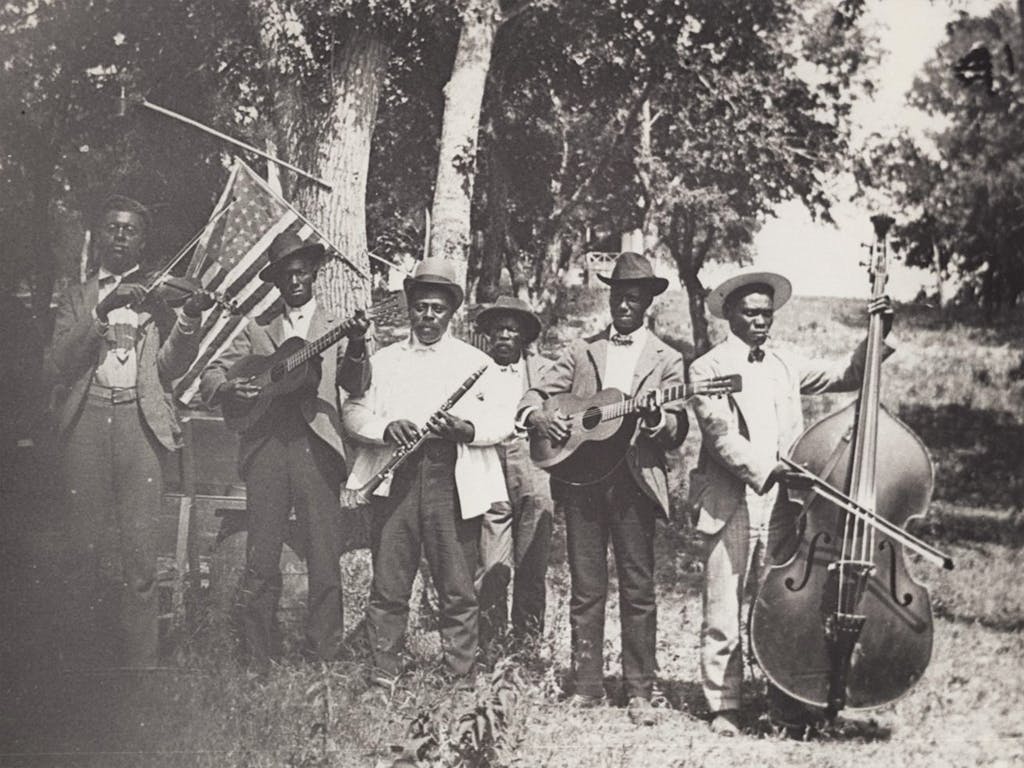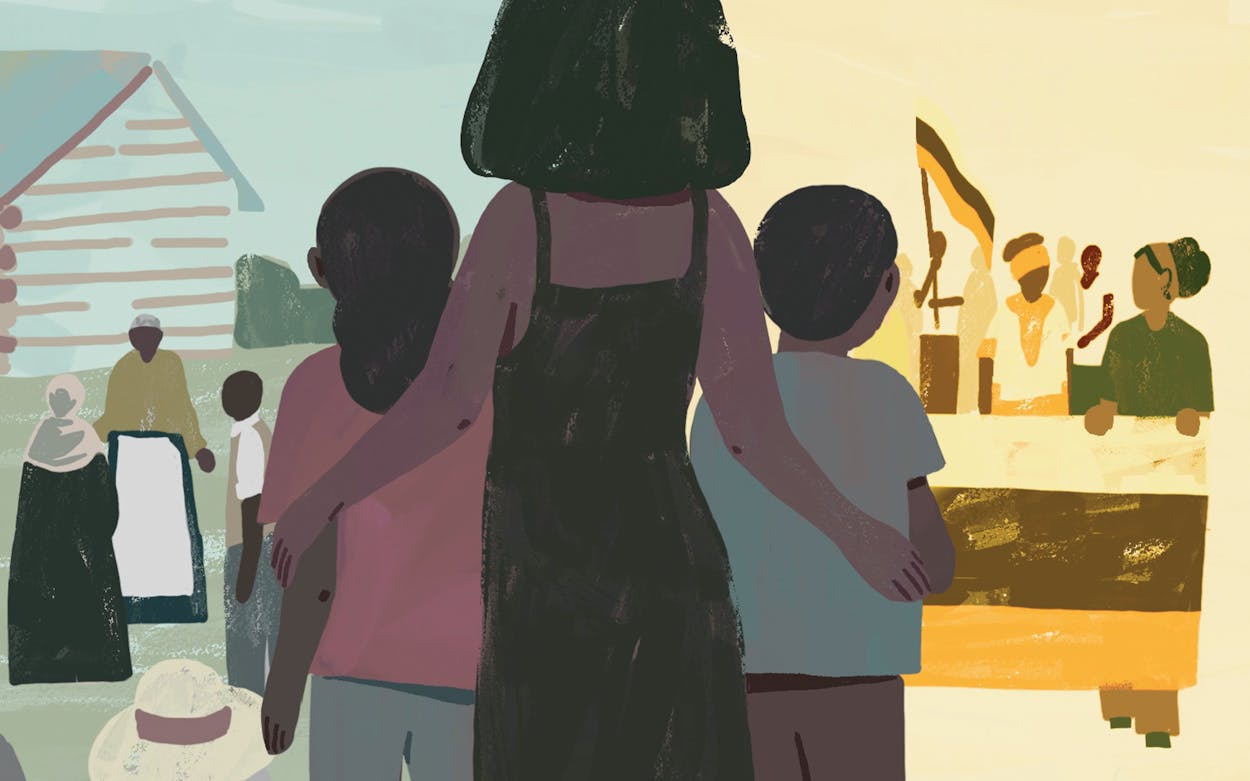In the historic Black neighborhood where I grew up in Dallas, a parade would roll off the lot of New Mount Zion Baptist Church on June 19, or the Saturday closest to it, and wend its way through a community where many of the streets were named for institutions and people central to Black history: Oberlin and Ebony. Bellafonte and Dandridge. Bunche and Campanella. Neighborhood celebrities—entrepreneurs, student body presidents, and original homeowners, or “pioneers,” as we called them—would ride like homecoming kings and queens atop convertibles.
When the Juneteenth parade made it to Willowdell Park, we’d have dinner on the grounds, featuring barbecue, sometimes a fish fry, and Big Red “soda water.” There would be three-on-three basketball tournaments under the pavilion and, in recent years, performances of African drumming and Indigenous dance in the field near the creek. Homegrown success stories, such as former Cowboys cornerback Everson Walls, would be inducted into the “Wall of Fame,” a mahogany display case with pride of place in the rec center’s front hall. It was always an intimate affair, among folks we’d known our entire lives who were living out values that our ancestors taught: faith and community, education and industriousness, and, above all, joy.
Growing up, though, I heard many people—relatives from Out West, recent transplants from Up North, Black elites eager to distance themselves from supposedly backward cousins—mock our parades and picnics as sad testimonials to being late and last. Juneteenth, a contraction of “June nineteenth,” commemorates the day in 1865 when Union general Gordon Granger arrived in Galveston to issue General Order No. 3, marking the end of slavery in the state. This happened two and a half years after the Emancipation Proclamation and two months after Robert E. Lee surrendered. The modern-day naysayers understood that devious forces—Texas slave owners, dodging President Lincoln’s order—had delayed the news of freedom. They just wondered why anyone would celebrate the fact that Black Texans were the last to know.

The answer, as the historian Annette Gordon-Reed explains in her new book On Juneteenth (Liveright/W. W. Norton & Company), is that Juneteenth was never about commemorating a delayed proclamation but about celebrating a people’s enduring spirit, before and after General Granger’s decree. My grandfather, an East Texas sharecropper born two generations out of slavery, is said to have celebrated no other holiday all year long. He and his contemporaries were remembering the emancipation of people they actually knew and refused to forget.
Over its 156-year history, Juneteenth’s popularity has waxed and waned. Throughout Reconstruction, Black Texans held massive outdoor celebrations, such as those at Mexia’s Booker T. Washington Park, a.k.a. Comanche Crossing. The entrenchment of Jim Crow in the early twentieth century drove many of those gatherings into more private spaces: backyard barbecues and church-ground picnics. Yet as Black Texans migrated out of cotton fields and headed for cities like Dallas, Oakland, and Detroit, they took their big, happy Juneteenth celebrations with them.
During the civil rights and Black Power movements, Juneteenth resumed its public tenor and gained national resonance, with Coretta Scott King headlining a Washington, D.C., celebration two months after her husband’s assassination. Today, when 48 states and the District of Columbia officially celebrate Juneteenth, a renewed interest in the holiday dovetails with a similar national reckoning. The post-racial fantasy of the Obama years has given way to a backlash: blatant attempts at voter suppression, a white nationalist presidency, and the increasingly militant defense of increasingly visible police violence—all signs of the inescapable reality that slavery’s legacy continues. Last year on Juneteenth, a meme circulating on social media quipped, “Free-ish Since 1865.”
In On Juneteenth, Gordon-Reed, an East Texas native, confesses to feeling slightly annoyed to discover that people outside Texas celebrate the holiday. For her, the “twinge of possessiveness” grew from a belief in Texas exceptionalism drummed into natives at birth. “Non-Texans could never really understand what the events that took place in Texas actually meant,” she writes. Her “proprietary attitude” passed soon enough. After all, Black Texans such as Fort Worth activist Opal Lee have campaigned to make Juneteenth a federal holiday, and Houston congresswoman Sheila Jackson Lee reintroduced the Juneteenth National Independence Day Act in February.
On Juneteenth provides context for these efforts by recounting the Texas history of Spanish exploration, French and American colonization, African influences, and Indigenous cultures that led up to the holiday. “No other state brings together so many disparate and defining characteristics all in one,” Gordon-Reed boasts, as we natives will do. Her academic training tempers that lifelong sense of Texas exceptionalism as she details with clear-eyed detachment yet enduring affection the Lone Star State’s outsized impact on the nation.
Texas topography is as varied as it is vast. There are the subtropical coastal plains along the Gulf, the steep slopes and plateaus of the Hill Country, the prairie grass and foothills of the Panhandle, and the sprawling urban centers throughout. It’s the deserts and plains of the West, though, that occupy the popular imagination. Hollywood depicts Texas as a frontier full of cowboys, rangers, and oilmen, with, as Gordon-Reed writes, “tumbleweeds blowing in the wind.” But that landscape is, as she notes, “relatively devoid of Black people.”
On Juneteenth pushes back against these stereotypes, taking readers east of the Balcones Escarpment to reveal a Texas that our myths have long obscured. East Texas is where slavery first existed in the state, where the Confederacy later reigned, where most Black Texans have lived or their ancestors hailed from.
As a historian, Gordon-Reed has spent her career exploring American families and their stories. In 2008 and 2009 she won a National Book Award and a Pulitzer Prize for The Hemingses of Monticello, which offered an in-depth look at a Black family on Thomas Jefferson’s plantation. In a series of loosely connected chapters, On Juneteenth sketches Texas’s past through Gordon-Reed’s own family history. In the chapter “A Texas Town,” for instance, she describes the post-slavery culture that defined life for generations of Black families in her hometown of Conroe, north of Houston, and throughout the state.
What Do Hawaii and South Dakota Have in Common?
They are, as of this writing, the only states that haven’t legally recognized Juneteenth as a holiday. (Though Hawaii’s legislature recently passed a bill making Juneteenth a state holiday, pending the governor’s signature.)
To illustrate the terror required to maintain Jim Crow, she recounts chilling stories of Black men lynched or murdered in open court without consequence after being accused of raping white women. Gordon-Reed recalls these atrocities not to rehearse “the cliché of hysteria surrounding the taboo of Black men and White women” but to emphasize Black America’s “alternative version of what had happened”: namely, that these were often consensual, if clandestine, relationships that were labeled rape only once discovered.
Gordon-Reed first came to prominence by insisting that scholars and the public take Black people’s versions of history seriously, no matter how inconvenient they may be. Her 1997 book Thomas Jefferson and Sally Hemings: An American Controversy bolstered long-standing Black oral histories that claimed that Jefferson fathered his slave Sally Hemings’s children. Gordon-Reed met with fierce opposition from the historical gatekeepers, but her persistence, DNA evidence, and the documentary record have since overturned the old scholarly consensus, validating both her research and this two-centuries-old Black truth.
Recognizing Juneteenth properly, she argues, requires confronting another inconvenient truth: the centrality of slavery to the founding of Texas. Visions of establishing a Western version of Mississippi’s cotton plantations prompted Stephen F. Austin, the Father of Texas, to tame “huge swaths of the Mexican province Coahuila y Tejas,” she writes. The soil was rich, the location near the Gulf ideal, but Austin knew any Americans attracted to the venture wouldn’t want to work the land themselves.
In seventh grade, my classmates and I were taught to view the six flags that have flown over Texas as a point of pride, as a tribute to the gallant men who fought at all costs for Texas independence. The real history presents a sobering counter-narrative: that slavery was the main reason the Texas project began, that Austin’s uneasy alliance with anti-slavery Mexico soon faltered, that the fledgling Republic of Texas joined the United States, and that it seceded fifteen years later with the Confederate States of America. To ignore this reality, Gordon-Reed writes, “suggest[s] that the lives of African Americans, and their descendants in Texas, did not, and do not matter.”
A unifying theme in On Juneteenth is the interplay between history and origin stories. History, Gordon-Reed writes, chronicles how things have changed over time, “with an understanding that those changes were not inevitable.” Origin stories, often a mix of memory and myth, tell “us what kind of people we believe we are, what kind of nation we believe we live in.” The traditional framing of the Juneteenth story has been a bit more myth than history. The naysayers’ focus on belatedness—on the fact that General Order No. 3 was announced after the Emancipation Proclamation, after the Civil War—perpetuated caricatures of Southern backwardness and ignorance, thus all the teasing about being “late and last.”
But, in fact, prior to Granger’s arrival, “the gist of the general order” had already landed at the wharves of Galveston, a port city that trafficked not only in cotton but in news from the rest of the world. Word of emancipation soon spread, but “the former slaves had to be very wary of open celebration,” as “Whites unleashed a torrent of violence” against those who dared rejoice. Once the rebels were subdued and Granger’s order pronounced, “Black Texans, in the face of this hostility, went about the business of making new lives”: reuniting with family sold away, attending school, and celebrating Juneteenth “come hell or high water,” as the Comanche Crossing saying goes. Honest history unsettles myth, and in this light, Juneteenth becomes not a marker of ignorance but a counter-narrative of resilience and resolve.
Perhaps the most salient aspect of Granger’s order is still the least recognized, Gordon-Reed writes. The announcement didn’t merely abolish slavery; it mandated “absolute equality of personal rights and rights of property between former masters and slaves,” completely repudiating cornerstone Confederate principles. Reconstruction scholars in the early twentieth century argued that the “equality” language was mere rhetoric signifying nothing. Given that we have yet to achieve that ideal, in Texas or across the nation, one might concede the point. But the beauty of history, Gordon-Reed argues, of knowing what didn’t happen as well as what did, is that it reminds us of what is yet possible.
On Juneteenth ultimately meditates on the double consciousness of being both Black and Texan. How, Gordon-Reed asks, can Black Texans be proud of their home state when “the stark reality is that the interests of the men most credited with envisioning Texas and bringing it into being were most often antithetical” to Black interests and hopes? “What does this mean for Black Texans thinking of the Texas past?” To answer these questions, this consummate historian suggests that we neither remember nor forget the Alamo but instead remember the people whose “boundless dreams [of freedom] took flight” before we were born, before they themselves were free, who taught us to imagine a better future and demand absolute equality despite those who would deny both. Remember Juneteenth.
Dallas native Angela Ards is a journalist and an associate professor of English at Boston College.
This article appeared in the June 2021 issue of Texas Monthly with the headline “Why Do We Celebrate Juneteenth?” Subscribe today.
- More About:
- Politics & Policy
- Books
- Dallas







